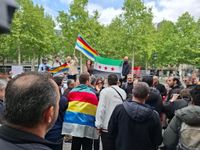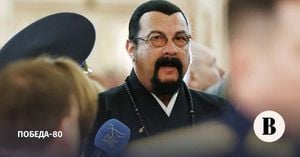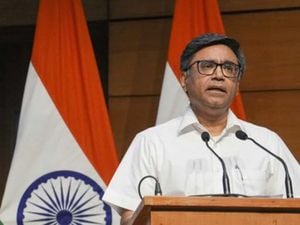On Wednesday, May 7, 2025, French President Emmanuel Macron hosted Syrian President Ahmad al-Shar'a in Paris, marking al-Shar'a's first visit to Europe since assuming power following the ousting of Bashar al-Assad's regime in December 2024. This meeting is poised to address several critical issues, including the lifting of sanctions, combating terrorism, and fostering regional stability in Lebanon.
The significance of this encounter is underscored by France's ambition to lead diplomatic initiatives aimed at supporting a new Syria and playing a pivotal role in the Middle East. The Syrian Network for Human Rights emphasized that the historical relations between Paris and Damascus motivated France to extend this invitation, making it the first European country to welcome the new Syrian leader. According to the network's director, Fadel Abdul Ghani, al-Shar'a's visit represents a crucial step towards reintegrating Syria into the broader international community.
Al-Shar'a's outreach is not merely ceremonial; it also aims to reshape Syria's image on the global stage. Ziad Majed, a political science professor at the American University in Paris, noted that al-Shar'a is seeking international engagement to present himself as a legitimate leader after gaining Arab legitimacy through his invitation to the Arab summit and meetings with various Arab leaders.
Macron's invitation to al-Shar'a, initially extended in February 2025, was contingent upon the formation of an inclusive Syrian government that represents all segments of civil society. The French president has reiterated his support for the establishment of a "free and independent Syria that respects all components of Syrian society," according to an official statement from the French presidency.
During this meeting, Macron is expected to address pressing economic issues, including reconstruction efforts and the potential lifting of certain sanctions, which are vital for Syria's recovery and stability. The discussions will also encompass the need for a comprehensive approach to minority representation and the protection of their rights, particularly in light of recent sectarian tensions.
Wassim Nasr, a journalist with France 24, remarked that al-Shar'a's visit is pivotal, asserting that lifting sanctions should not be viewed as a favor to the Syrians but rather as a necessary step towards rebuilding the war-torn nation. The French president's agenda will likely include discussions on energy cooperation and the aviation sector, both critical for Syria's economic revitalization.
However, the visit has not been without controversy. Protests erupted in Paris, organized by Syrian expatriates who condemned al-Shar'a's visit, raising the Syrian revolution flag and chanting slogans advocating for unity among the Syrian people. Demonstrators called for accountability for recent violations against civilians, particularly among minority groups such as the Alawites and Druze.
These protests coincided with the formal reception of al-Shar'a at the Élysée Palace, where official ceremonies were held with the presence of the Republican Guard. The French presidency emphasized the importance of supporting a "free, stable, and sovereign Syria" that respects all its citizens.
Al-Shar'a's visit comes at a sensitive time, following a series of violent incidents in Syria, including clashes that resulted in the deaths of over 1,700 Alawites in March 2025 and recent violence involving the Druze community. These events have raised concerns about the stability of the transitional authority and the ongoing threat of sectarian violence.
In light of these challenges, Macron's administration is keen to reaffirm France's commitment to engaging with all Syrian factions to ensure a balanced and inclusive governance structure. French Foreign Minister Jean-Noël Barot stated that France will not offer a "blank check" to the new Syrian leadership but will evaluate al-Shar'a's actions moving forward.
Political analysts suggest that France's decision to host al-Shar'a reflects its historical ties to the region and its desire to regain influence lost during the Syrian conflict. France severed relations with the Assad regime in 2012 and has since supported opposition forces, including the Kurdish groups in northern Syria.
Critics of the visit argue that welcoming al-Shar'a, who has a controversial past linked to extremist factions, could undermine France's democratic values. However, supporters, including former minister Xavier Bertrand, contend that engaging with al-Shar'a is essential for fostering peace and security in the region.
As the first European nation to formally engage with al-Shar'a, France aims to position itself as a leader in Middle Eastern diplomacy, especially in the absence of a strong American presence. The visit is seen as an opportunity to gauge al-Shar'a's intentions and to explore potential avenues for cooperation in rebuilding Syria.
The discussions are expected to touch on the critical need for reconstruction and the return of refugees, with France pledging support in areas such as education, health, and infrastructure, contingent upon the security and rights of all citizens being guaranteed.
In conclusion, al-Shar'a's visit to France is a landmark event in the evolving dynamics of Syrian politics and international relations. As both leaders navigate the complexities of rebuilding a fractured nation, the outcomes of their discussions will likely shape the future of Syria and its integration into the global community.




